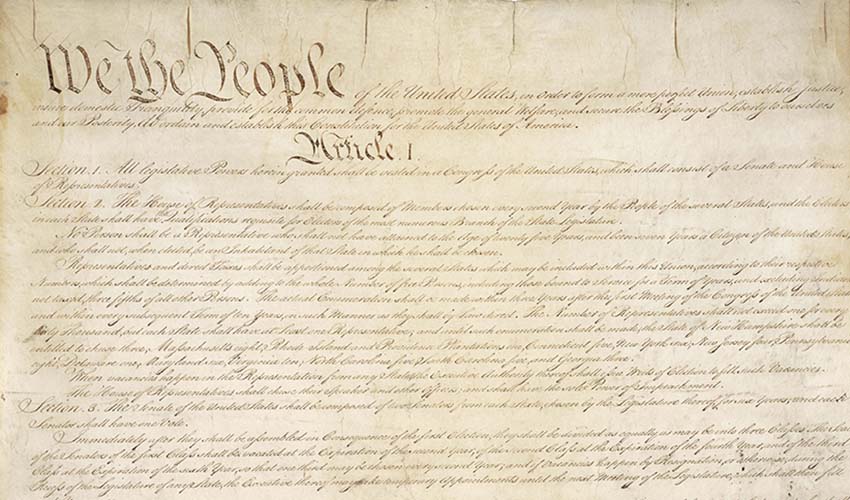Trump’s ‘war’ against media threatens democracy, say SF State experts

The United States Constitution Credit: National Archives
Donald Trump declares war on the news media when quality coverage is critical
The Trump Administration has made one thing clear during its brief time in office: the news media, if critical of its policies and behavior, is the enemy. The day after his inauguration, Trump addressed a crowd at CIA headquarters and slammed journalists, calling them the “most dishonest human beings on Earth” and declared he’s in a “running war” with reporters. This came after The New York Times tweeted side-by-side photos of the crowd sizes at Obama’s 2009 inauguration and Trump’s. Trump labeled this “fake news.”
Being called names is not new for reporters, and neither is digging for the truth. Journalists have always had to have thick skin and it’s their job to be skeptical, said San Francisco State University Assistant Professor of Journalism Laura Moorhead. What’s most worrisome to SF State journalism professors is how Trump has delegitimized the media as a viable source of information. This is especially troubling given his well-documented propensity to pass fiction off as fact.
The First Amendment guarantees the freedom of the press. And that’s because the framers of the Constitution intended for the news media to act as the public’s watchdog. SF State Professor of Journalism Jon Funabiki said discrediting the press is bad for the nation’s democratic process because it depends on those checks and balances.
“Journalists are doing what they’ve always done, serving as an independent observer of people and institutions in power,” he said. “President Trump does not like to be watched over, second-guessed or opposed. He’s used to having the ability to do anything he wants. There’s a natural friction between these two forces, and it’s not good for our democracy.”
The president has a pattern of calling unfavorable coverage fake news, said SF State Associate Professor of Journalism Venise Wagner, and he’s been successful at raising public doubt over media reports. “Reporters have to be willing to explain to the public why they went after a story,” she said. “The more transparent journalists are, the more the public will understand and believe what they’re doing.”
The public has been losing trust in the media for years and that fissure deepened during the 2016 election after many mainstream news outlets failed to foresee a Trump victory, Funabiki said. “The major hurdle facing journalists is their inability to understand the true diversity of people in this country,” he said. “Journalists aren’t really able to get down to the grassroots level and understand what people are interested in, what they’re concerned about and what they want from their journalists.”
Journalists have to a do a better job of ensuring they get diverse perspectives. Many people mistrust the media because they don’t feel represented, Wagner said. “We need to hear liberal voices, conservative voices, the thoughts and ideas of immigrants and people of color and whites,” she added. “Some facts are more important to some people than others and journalists need to explain those varying points of view.”
Community newspapers are disappearing, so there’s a growing disconnect between the media and the communities they serve, Moorhead said. Journalists can regain favor with the public by thinking about what’s most important and relevant to the communities they cover.
“It’s not that people don’t care that there’s incorrect information, it’s that they don’t feel it affects their lives,” Moorhead said. “People will take action and pay attention if they generally think something is going to impact their lives.” For example, if a report came out about high levels of toxins in the local water supply, that community would likely turn to journalists for accurate information, she added.
Having more intimate conversations in a town hall-like setting with their audiences can also improve public perception of the news media, Funabiki said. “Trump’s goal is to win. He doesn’t care how he wins. His strategy is to attack every other institution to make them the bad guy, so he looks like the only knight in shining armor, and he’s very effective at it,” he said. “A fact-based strategy won’t defang Donald Trump. And that shouldn’t be our goal. Our goal should be to reestablish credibility with the broad community so that they trust us.”
The public also needs to be savvy news consumers and recognize that whenever they click on something, that’s an endorsement, Moorhead said. “So, when we say we want good journalism, are we backing that up by clicking on and subscribing to quality journalism? Are we seeking out investigative journalism, or are we clicking on links from those random tweets that may be dubious and sitting back and watching cat videos?”
The professors agreed that there is a ray of light in the contentious media climate. Wagner said she’s seen a fire in her students that wasn’t there before. And while it’s a challenging time for those working in the news industry, she said, it’s also exciting.